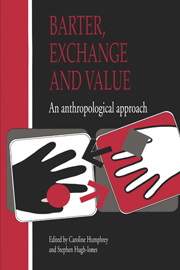Book contents
- Frontmatter
- Contents
- List of figures
- List of contributors
- 1 Introduction: Barter, exchange and value
- 2 Politicised values: the cultural dynamics of peripheral exchange
- 3 Yesterday's luxuries, tomorrow's necessities: business and barter in northwest Amazonia
- 4 Some notes on the economics of barter, money and credit
- 5 Fair dealing, just rewards: the ethics of barter in North-East Nepal
- 6 Inter-tribal commodity barter and reproductive gift-exchange in old Melanesia
- 7 Qualified value: the perspective of gift exchange
- Index
3 - Yesterday's luxuries, tomorrow's necessities: business and barter in northwest Amazonia
Published online by Cambridge University Press: 05 June 2012
- Frontmatter
- Contents
- List of figures
- List of contributors
- 1 Introduction: Barter, exchange and value
- 2 Politicised values: the cultural dynamics of peripheral exchange
- 3 Yesterday's luxuries, tomorrow's necessities: business and barter in northwest Amazonia
- 4 Some notes on the economics of barter, money and credit
- 5 Fair dealing, just rewards: the ethics of barter in North-East Nepal
- 6 Inter-tribal commodity barter and reproductive gift-exchange in old Melanesia
- 7 Qualified value: the perspective of gift exchange
- Index
Summary
Central to capitalism is a vision of man's limitless needs, needs which lead to his increasing mastery of nature and which propel him onwards and upwards in a spiral of progress. In contemporary Amazonia, and with such progress in mind, missionaries, merchants and government officials vie with each other to bring the material and moral benefits of civilisation to Amerindians. Each mission combines church with store, and even the cocaine-dealers claim a civilising mission as they barter coca leaves for coca-cola.
Long ago, in his Second Discourse on Inequality, and possibly with these same Amerindians in mind, Rousseau questioned this optimistic view of progress and rewrote its history as a tragedy:
This new condition, with its solitary and simple life, very limited in its needs, and very few instruments invented to supply them, left men to enjoy a great deal of leisure, which they used to procure many sorts of commodities unknown to their fathers; and this was the first yoke they imposed upon themselves, without thinking about it, and the first source of the evils they prepared for their descendants. For not only did such commodities continue to soften both body and mind, they almost lost through habitual use their power to please, and as they had at the same time degenerated into actual needs, being deprived of them became much more cruel than the possession of them was sweet; and people were unhappy in losing them without being happy in possessing them.
(1984: 113)- Type
- Chapter
- Information
- Barter, Exchange and ValueAn Anthropological Approach, pp. 42 - 74Publisher: Cambridge University PressPrint publication year: 1992
- 52
- Cited by



